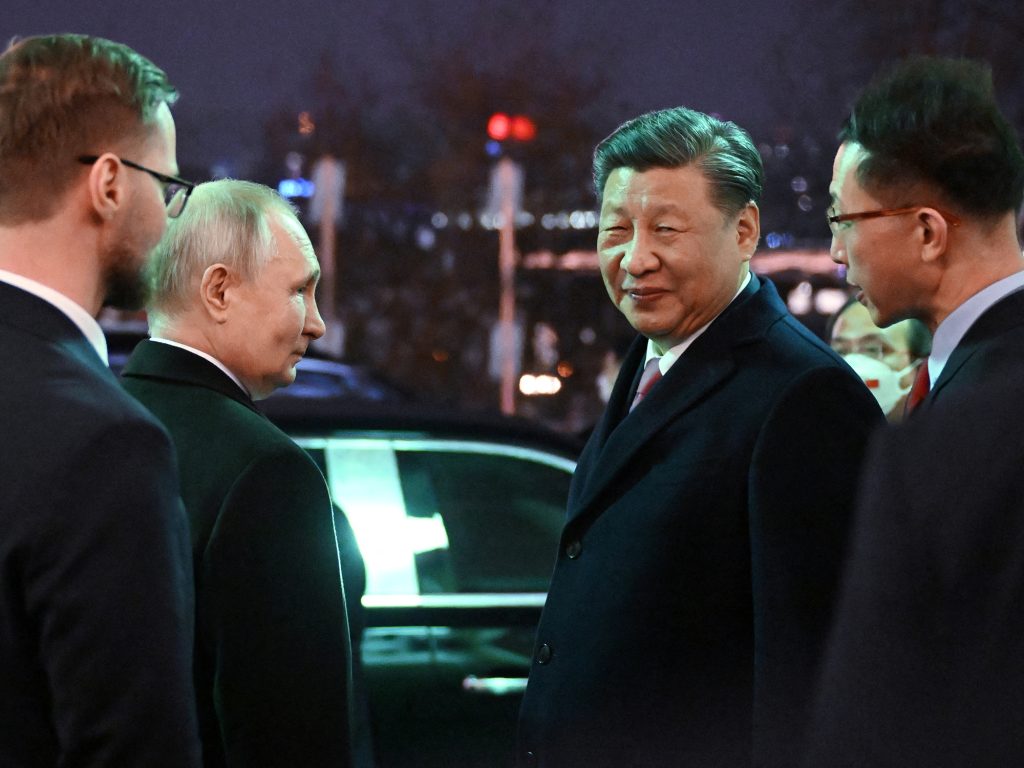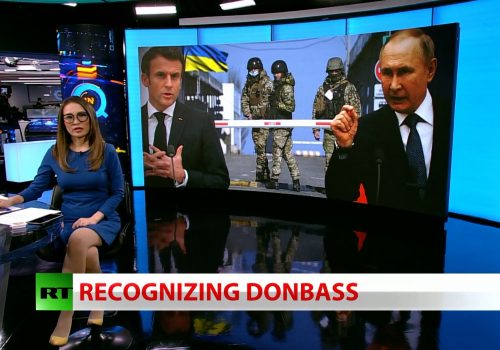More than a year into Russia’s full-scale invasion of Ukraine, the consequences continue to reverberate worldwide. While the conflict has come at a massive cost to Ukrainians, Russian President Vladimir Putin has ultimately failed to achieve his political aims by force. Dozens of countries have joined forces to provide Ukraine assistance, whereas Russia’s list of partners is much shorter. Notably on that list, however, is China. Despite Beijing’s claims that it is neutral in this conflict, Chinese President Xi Jinping has stood by his “no limits” partnership with Putin, underscored by his visit to Moscow at the end of March where the two leaders toasted their friendship. China has continued to deepen its economic ties with Russia and has refused to condemn the invasion. However, China is watching the course of the invasion closely, which raises questions about what Beijing will do—and not do—as tensions over Taiwanese sovereignty escalate.
As China weighs whether to adjust its tactics to avoid Putin’s failures, the United States can look to Ukraine’s and the West’s successes in thwarting Putin for lessons on how to counter Chinese aggression. We asked the experts from our Gray Zone Task Force to lay out the lessons US policymakers should draw that could help in hybrid conflict with China.
Jump to an expert reaction
Marc Polymeropoulos: Washington shouldn’t expect Beijing to make the same mistakes as Moscow
Jennifer Counter: Messaging matters for all sides in warfare
Putin’s failures show Beijing that the risks and costs of missteps in hybrid warfare are still high
Even with decades of practice in hybrid warfare, Russia’s poor execution of its “special military operation” in Ukraine shows China that it is still critical to get the fundamentals of warfare right:
Planning and decision making: Russia opted to rely primarily on blunt kinetic force when attacking Ukraine, choosing conflict models it previously used in Georgia and Chechnya, instead of choosing models that are more reliant on gray-zone activities in hybrid warfare—ones that previously yielded success for Moscow. Those models can be seen in the infiltration of little green men in 2014 or in the political terror activities that colored Russia’s relationship with Ukraine in the mid-2000s. Beyond taking longer than the Kremlin expected, and exposing holes in the perceptions of Russian strength, this “operation” has ultimately resulted in considerable atrocities for Ukraine. But the reality is that Russia has not achieved Putin’s objectives, including objectives that were likely used to justify choosing this course of action. While it is not specifically clear why Russia chose this model of warfare instead of tapping its previously validated strengths, it is clear that the decision has not worked out for them. The more recent assignment of General Valery Gerasimov, father of a significant portion of Russian hybrid-warfare doctrine, to be the commander in Ukraine may indicate recognition of critical missteps in planning and decision making, or portend a shift to Russian strengths in the gray zone.
Intelligence: Intelligence is fundamental to warfare, especially hybrid warfare. However, the Russian intelligence apparatus has demonstrated that it cannot be relied upon to take a stand to communicate objective truths. This can be attributed to the fear of repercussions when working for an authoritarian state. The international security community expected that Putin, often credited with being savvy due to his experience as a Cold-War era KGB intelligence officer, would recognize the importance of honest, unbiased intelligence to inform his policy and military decision making. Instead, his intelligence leaders have likely fed him messaging that miscalculated the situation on the ground in Ukraine—and the global ramifications of invading. Those leaders seem to have continued to double down in doing so over the past year, echoing critiques of the United States’ pre-Iraq War bias.
Sustainment: Sustainment covers a broad category of activities that are required for prolonged military operations, including maintaining equipment and ensuring its serviceability, shoring up the supply chain for weapons systems and ammunition, managing contested logistics or sustaining personnel- and life-support services taking care of Russian troops in Ukraine, and regenerating or replenishing attrited forces. The Wagner Group’s recruitment of criminals from Russian prisons to fight in Ukraine has been one clear indicator of Russia’s failure at sustainment. There is an expression in US military circles about sustainment: “Amateurs talk tactics. Professionals talk logistics.” By this measure, Russian efforts have been amateur hour.
Many pundits have accurately stated that “Taiwan is not Ukraine” when describing what China may glean from this invasion. However, the statement automatically assumes that the lessons would solely be related to Taiwan and dismisses concerns about Beijing’s claims in the South China Sea and East China Sea or even territories bordering Western China.
That “Taiwan is not Ukraine” also further implies that China won’t learn anything from observing Putin’s daily failures. But there are a few things China has learned or will continue to learn. First and foremost, if it chooses to swap from gray-zone activity to kinetic aggression or military action in order to challenge the rules-based order, China will likely recognize the risk and uncertainty that comes from being a military force untested by recent large-scale conflicts. Post-Cold War Russia was such an untested military force; while China has made strides in military modernization and advanced technologies, it similarly does not know how successful it will be when tested in battle. China will also likely realize that in one year, the Kremlin’s missteps have definitively cost Russia a seat at the great-power table and the influence it needed to be relevant—even if Russia is still dangerous. While Russia falls far short of China in terms of international and economic stature, the risk and costs of missteps may deter China from taking action when potential gains do not outweigh the risks and costs. With increasing rhetoric over a future potential conflict with China, it would also be prudent for the United States and its allies to shape policies, plans, and engagement to account for China’s updated perspectives from Russia’s invasion.
—Arun Iyer is a nonresident senior fellow at the Scowcroft Center for Strategy and Security’s Forward Defense practice and served in a variety of operational and operational leadership assignments in the US Department of Defense from 2005 to 2020.
Washington shouldn’t expect Beijing to make the same mistakes as Moscow
The war in Ukraine has been a debacle for Russian intelligence. Soiled by hubris, corruption, and incompetence, Russian intelligence—led by the Federal Security Service (FSB)—encouraged and reinforced Putin’s desire to invade Ukraine. The FSB performed so poorly in Ukraine—where it had primacy over the Russian Foreign Intelligence Service (SVR) and the military intelligence agency known as the GRU—that it is remarkable the top leadership has remained in place.
As a result of the invasion, the overall global presence of Russian intelligence has been decimated. The United States and other NATO members went on the offensive, expelling over four hundred Russian government officials serving in their countries. In addition, multilateral intelligence cooperation has led to the arrests of numerous Russian agents across Europe. This campaign almost certainly degraded the ability of the SVR and the GRU to recruit and handle agents and conduct active measures campaigns in the West.
US policymakers must consider whether Beijing will up its intelligence game in a future military move on Taiwan. Three fundamental Russian-intelligence missteps, and questions for Chinese intelligence, include:
- Operational preparation of the environment (OPE): OPE is foundational to any successful military operation. The FSB thought they had Ukraine wired, with a network of Ukrainian agents, to quickly capture Kyiv. Yet the FSB was wrong in nearly every facet of its OPE. Agents either did not perform or disappeared, stealing money allocated for the invasion. Russian assumptions of Ukrainian compliance, timidity, and passivity were wildly off. No doubt, China has taken notice. As such, is Chinese intelligence ensuring that their agents who have penetrated Taiwan are all trusted, vetted, and reliable—and have they rooted out corruption in their ranks?
- Anticipated foreign reaction: Putin surely missed that the United States, and even countries in NATO that were previously friendly to Russia, would support Ukraine so vigorously. Putin seems to have thought he could take Ukraine as he had Crimea. China certainly has been surprised by this Western resolve. A question remains: Is the US policy of strategic ambiguity enough to assure Beijing and deter it from a move on Taiwan? Does China assess that the world will rally to Taiwan’s defense?
- Telling truth to power: Putin ally Yevgeny Prigozhin was one of the only Russian national-security figures to tell Putin that his war was a mess. Previously, a note of dissent could cause someone to quite dramatically “fall out of their apartment.” The current Russian intelligence apparatus cannot be relied upon to give unvarnished assessments to Putin. While Russian intelligence leaders own their share of responsibility for this situation, it is primarily a byproduct of working for an authoritarian state and the fear that comes with it. Rather than course correcting, Russian intelligence seems to have continued to double down on its biased assessments. Does China have a healthy enough intelligence system in place with the ability (and courage) to tell the truth to Xi?
China no doubt is keenly aware of this historic Russian intelligence debacle and is likely conducting a continuous and dynamic after-action review. Ultimately, the United States should not expect Beijing to make similar mistakes.
—Marc Polymeropoulos is a nonresident senior fellow in the Forward Defense practice and worked for twenty-six years at the Central Intelligence Agency.
When it comes to China, the West can’t rely on an economic strategy designed to weaken Russia
On the economic front, there are significant lessons for the West to learn from Russia’s full-scale invasion of Ukraine when looking to deter Chinese aggression.
First, sanctions are long-term tools and thus have little deterrent or retaliatory impact against short-term actions such as the Kremlin’s “special military operation” in Ukraine or possible action by China against Taiwan. In fact, the relative ineffectiveness of the West’s sanctions against Russia thus far reinforces this point and creates a precedent from which others, including China, will learn. There have been fairly tight and unified sanctions against Russia such as the European Union’s decisions to place an embargo on Russian oil and to exclude some Russian banks from the SWIFT messaging system. But Russia’s gross domestic product has shrunk only modestly, inflation has been manageable, the ruble has remained relatively stable, and the country’s trade surplus actually grew in 2022. Yes, restricting energy sales (Russia’s chief source of income) will eventually cause material economic harm, but these measures take years, not months, to work.
Second, a multilateral approach to economic strategy is critical. If Germany and other European nations had not rallied together to limit purchases of Russian oil, there would have been a massive hole in the economic front against Russia, allowing for continued energy sales in the long run. Despite fears that European unity on purchasing oil would fray over time, particularly in the winter months, the unified front has only strengthened, with more economic restrictions being put into effect now against Russia. The Biden administration has learned from this experience and is duplicating the multilateral game plan in its strategy for managing competition with China. After announcing in October 2022 strict limits on the export of semiconductors—and the equipment used to make them—to China, the Biden administration followed up in January by quietly pressuring the Netherlands and Japan, two other critical suppliers, to follow suit.
Third, in the event of an attack against Taiwan, any economic action in response must consider the differences between China and Russia. China has the second-largest economy in the world, and Russia is not even in the top ten. Moreover, China is much more integrated into the global economy than Russia. For decades there has been extensive trade, investment, and supply-chain dependency shared among China, the United States, and US allies, particularly in the technology sector. This makes any US or allied effort to use economic measures to leverage desired outcomes vis-à-vis China much more difficult.
For Russia, the required economic strategy is relatively narrow—limit energy sales, restrict access to the global banking system, and disrupt technology supply chains. Yet, these measures have had only a modest effect. The actions taken to cut off China’s external supply chain for semiconductors, combined with the attempt to bolster US semiconductor manufacturing under the CHIPS Act, represents the complex nature of how best to combat China. It takes both unilateral and coordinated action among countries that rely on China, and it must be multi-faceted in nature, denying China the inputs it needs while also shoring up US and allied manufacturing capabilities. Even then, due to China’s efforts to become self-sufficient in many key inputs, as well as the country’s financial strength and global reach, the use of an economic strategy to deter China will be challenging to implement and likely limited in its impact.
—David L. Fogel is a nonresident senior fellow in the Forward Defense practice.
Messaging matters for all sides in warfare
While the February 2022 invasion of Ukraine caught many inside and outside of the country by surprise, Ukrainians quickly mobilized and coalesced around one key message: Russia invaded Ukraine, and it is not welcome there. It is a simple statement, but one that Ukrainians and foreigners alike can understand and act on. Various sub-messages telling Russia that it is unwelcome continue to emerge out of this core idea and are frequently created not by advertising executives, but by university students, retirees, and all members of society. Some messages emerge by chance, such as a Ukrainian woman telling Russian soldiers to carry sunflower seeds so the flowers will grow on their graves when they are killed in battle; others are carefully orchestrated, like the use of the Bananarama song “Cruel Summer” in a video conveying the sentiment that Russians are not welcome in Crimea because, well, Crimea is part of Ukraine.
In the case that a conflict involving China ignites, the ability to rally around a clear message will be vital to those on both sides of the fight. As Ukraine shows, core messages are important for communicating the necessity of the fight, justifying actions taken, and recruiting military personnel and civilian support. Should China be the aggressor and invade another country or initiate military operations, it should not underestimate the power of an opponent unified by core messages, even if that opponent is not particularly well organized. If the United States or another country is the aggressor, the support that the Chinese military receives from the Chinese population, domestic and international, could be a significant factor in determining whether the fight succeeds—or fails. As Ukraine has proven, ordinary people will find a way to support the overall effort using skills that they have—from infantry tactics to social-media propaganda. A clear message that is understood by both domestic and international audiences (and can be repeated over and over) has power: Receivers of that message abroad can vote, donate funds, or lobby politicians.
Russia’s use of its information network shows how China may use its own network to convey messages that support Beijing’s choices in hybrid warfare. Putin places a high value on information and public perception. RT News, Sputnik News, and the Russian Orthodox Church, among others, all contribute to a robust network framing events in a way that benefits Putin, elite Russians, and Russia as a global actor—often in that order. Russian-controlled media outlets, influencers, and government entities—such as Russian embassies abroad—have by and large remained in lockstep with the framing of the full-scale invasion as a “special military operation,” and more recently a “war with the West,” parroting Putin’s justifications of the invasion, which reference World War II and terrorism threats.
Overall, the Russian population has stood by Putin despite the heavy losses taken by the Russian military. The same will likely be true for the Chinese domestic population should Beijing move against Taiwan, the United States, or another adversary. Like Russia, China has a robust media and influence network—arguably larger in terms of global reach—and is able to control the messages heard by the general public while intertwining government messages with history and national aspirations. The United States should anticipate that dissent within China would be limited and those voices that do emerge would likely be silenced or marginalized. With a lack of dissent, the Chinese population, much like the Russian population today, would continue to support military operations, even as the casualties mount. The Chinese national security apparatus’ growth in recent years, to include police stations in foreign countries, has reach far outside the country’s borders and could easily use intimidation, fear, and rendition-type activities to silence dissidents or their families. Pro-China groups and associations could potentially also act as a mechanism through which the Chinese government can monitor, and ultimately try to influence, Chinese nationals living abroad.
As seen in Ukraine, leadership plays an important role in conveying clear messages. Ukrainian President Volodymyr Zelenskyy’s leadership teaches the United States two lessons that should inform how conflict with China could play out. First, his example shows that an unlikely leader with little formal geostrategic knowledge should not be discounted; and second, his efforts over the past year show that thoughtfully targeting decision makers abroad and engaging with them frequently can drive support. Many doubted the Ukrainian president’s leadership in the beginning of the full-scale invasion due to his lack of strategic military expertise.
In contrast, Zelenskyy has continued to lead and his skillful work with the media and celebrities, like Sean Penn, has proven invaluable. His speeches to the US Congress, on late-night chat shows, and at star-studded awards events have ensured that Ukraine stays front and center in the minds of decision makers and influencers. Zelenskyy and his team have set the bar high for future national leaders facing war and conflict—they’ll now be expected to create a shopping list of military material (and put foreign allies on the spot for providing it), make a far-away war feel relevant to average people, and stand strong against an imposing opponent. For any conflict against China, it would be wise for the United States to empower a leader like Zelenskyy to reassure the population under attack, keep the home front motivated, and communicate support to troops. That leader should hold allies accountable for their rhetoric, which may strike some as pushy, but it ultimately secures the underdog needed tanks, missiles, and foreign volunteers, as Zelenskyy has shown.
—Jennifer Counter is a nonresident senior fellow at the Forward Defense practice and a former US foreign service officer and Air Force intelligence officer.
Further reading
Fri, Sep 30, 2022
How the US can focus its fight against foreign influence operations
Hybrid Conflict Project By Jennifer A. Counter
Understanding exactly what US adversaries plan to do in the information space is vital to building domestic defenses.
Fri, Jun 10, 2022
The future of US security depends on owning the ‘gray zone.’ Biden must get it right.
Hybrid Conflict Project By Clementine G. Starling-Daniels, Julia Siegel
The United States' ability to prevail in the gray zone will hinge on coordinating and executing a whole-of-nation response.
Tue, Dec 13, 2022
The National Defense Strategy shows the Pentagon’s increased focus on the gray zone. Here’s what that means.
Hybrid Conflict Project By
The DOD is officially recognizing that competitors’ coercive and malign activities in the gray zone present a challenge to US security. What does this mean for US strategy in the years ahead?
Image: Russian President Vladimir Putin and Chinese President Xi Jinping leave after a reception in honor of the Chinese leader's visit to Moscow on March 21, 2023. Photo via Sputnik/Grigory Sysoev/Kremlin via REUTERS.



